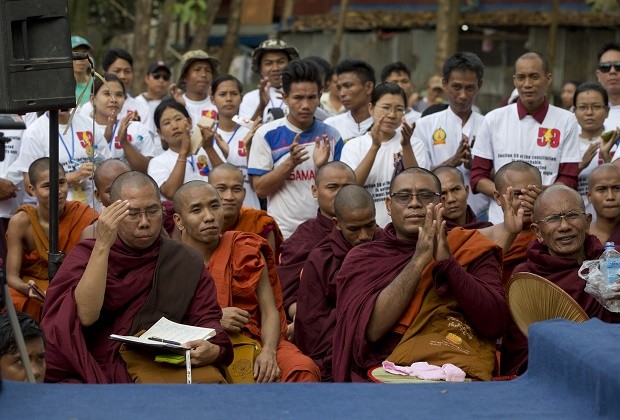
In this Sunday, Feb. 28, 2016 photo, supporters of Myanmar nationalist groups, including Buddhist monks, applaud in support of preserving a constitutional clause barring Aung San Suu Kyi, the popular leader of the country’s new ruling party, from becoming head of state, in Yangon, Myanmar. Nobel laureate Suu Kyi’s decades-long battle to bring democracy to Myanmar is likely to come to fruition on Thursday, March 10 with a whimper, not a bang. Despite leading her National League for Democracy party to a smashing election victory, Suu Kyi seems certain not to become her country’s leader. Suu Kyi, 70, cannot be president because the constitution bars anyone with a foreign spouse or children from holding the executive office. Suu Kyi’s two sons are British, as was her late husband. AP
NAYPYITAW, Myanmar — A longtime confidante of Nobel laureate Aung San Suu Kyi was confirmed Friday in a parliamentary vote as one of the three final candidates to be Myanmar’s next president.
Htin Kyaw of the National League for Democracy party was approved by a 274-29 vote in the lower house of parliament to be a finalist for the presidential election next week. A vote is underway in the upper house to choose the second finalist. A third candidate will be put forward by the military bloc, which has a constitutionally mandated 25 percent of reserved seats in parliament.
Legislators from both houses of parliament will hold another round of voting to choose one of them as president, which almost certainly will be 70-year-old Htin Kyaw. The other two will become vice presidents since the NLD has an overwhelming majority in both chambers following its landslide victory in the Nov. 8 general elections.
They will take office April 1 to head what will be Myanmar’s first democratically elected government in more than a half century. But for all practical purposes Htin Kyaw will be a proxy for Suu Kyi, who has said she will be “above” the president and rule from behind the scenes.
This arrangement came into being because Suu Kyi is barred by the constitution, which says anyone with a foreign spouse or children cannot hold the executive office. Suu Kyi’s two sons are British, as was her late husband. The clause is widely seen as having been written by the military, for long Suu Kyi’s bitter adversary, with her in mind.
READ: Aung San Suu Kyi will not become Myanmar’s next president
“We are satisfied that Htin Kyaw has won to become one of the presidential candidates. We believe that we soon will be able create our country’s better future. We chose him because he is a very suitable person and skillful to become the president,” said Myo Zaw Aung, an NLD legislator.
Htin Kyaw (pronounced Tin CH-yaw) is a computer science graduate from the University of London, and is contemporary of Suu Kyi, who also is 70. He enjoys her full confidence, and was usually seen by her side during her long struggle to bring democracy in Myanmar.